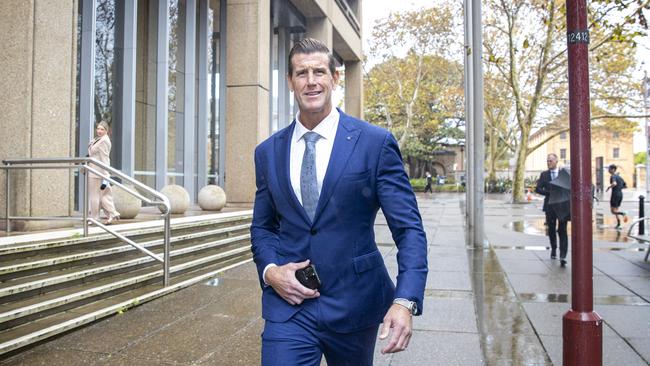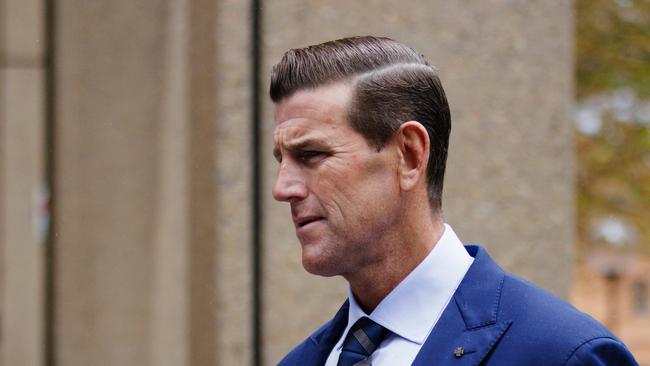‘Unlike most homicides’: Why BRS appeal over war crime findings failed
A court has released its reasons for throwing out Ben Roberts-Smith’s defamation appeal, saying two errors by a judge were “immaterial”.
Breaking News
Don't miss out on the headlines from Breaking News. Followed categories will be added to My News.
Ben Roberts-Smith failed in his appeal against his blockbuster defamation suit after a court found that he gunned down a man with a prosthetic leg and “unlike most homicides, there were three eyewitnesses to this murder”.
Roberts-Smith was last week struck a massive blow when he failed in his bid to overturn his loss to Nine Newspapers over a series of stories making war crime allegations relating to his deployment in Afghanistan.
In a landmark judgment, Federal Court Justice Anthony Besanko in June 2023 dismissed Roberts-Smith’s multimillion-dollar lawsuit against The Sydney Morning Herald, The Age and Canberra Times and found that he was involved in the murder of four unarmed men.
The findings were made on the balance of probabilities, which is less than the criminal standard of beyond reasonable doubt.
His appeal to the Full Court of the Federal Court was on Friday dismissed by Justices Nye Perram, Anna Katzmann and Geoffrey Kennett.
The court’s full reasons were published on Tuesday after lawyers spent the last four days ensuring it did not compromise national security.

The court found that while Justice Besanko made two errors in his judgment, they were described as “immaterial”.
“They do not affect His Honour’s conclusions on any of the critical questions,” the Full Court of the Federal Court found.
“ … In a long, careful and clear judgment, the primary judge correctly identified and applied the relevant legal principles and paid close attention to the serious nature of the allegations and the standard of proof.
“His Honour repeatedly reminded himself that the respondents bore the onus of proving the substantial truth of the imputations and of the cogency of the evidence necessary to discharge it.”
Roberts-Smith has already vowed to take his fight to the High Court of Australia.
Among the findings that Roberts-Smith was seeking to overturn was the allegation that he took part in the murder of a handcuffed shepherd, Ali Jan, at Darwan in September 2012.
Roberts-Smith also disputed findings that he was involved in the killings of two prisoners at a compound called “Whiskey 108” in 2009.
According to the allegations, Roberts-Smith shot one man in the back and directed a “rookie” soldier to shoot another prisoner.
The court said in its judgment that it had been found that Roberts-Smith “frogmarched” a man with a prosthetic leg “out of the compound to a point at its northwest corner, threw him on the ground and executed him with machine gun fire”.
“The problem for the appellant is that, unlike most homicides, there were three eyewitnesses to this murder,” the Full Court of the Federal Court found.
It found there were “inconsistencies” in the testimony of some of the witnesses.
However, the court said in its judgment: “Their testimonies each had the three key central features described by the primary judge: the forcible and aggressive moving of a (person under control) to the northwestern part of Whiskey 108; the hearing of a burst of machine gun fire; and the seeing of a man being machine-gunned.”
The three Justices said: “When all is said and done, it is a rare murder that is witnessed by three independent witnesses.
“The appellant’s efforts to construct uncertainty out of inconsistencies in peripheral detail are unpersuasive.”
Justice Besanko also found that Roberts-Smith, during an operation at Chinartu, directed members of the Afghan partner forces to shoot a man following the discovery of a cache of weapons.
Roberts-Smith continues to deny the allegations and in a statement on Friday said: “Sunlight is said to be the best disinfectant, and I believe one day soon the truth will prevail.”

Roberts-Smith’s lawyers had argued that Justice Besanko had failed to take into consideration the “Briginshaw principle”, which dictates that serious allegations should be treated cautiously when a court makes findings.
“We reject this argument,” the Full Court of the Federal Court found.
“The primary judge discussed the relevant principles at length in the early part of his reasons and repeatedly reminded himself of them.”
It found that Justice Besanko repeatedly mentioned in his judgment the important legal principles of the presumption of innocence and the seriousness of the findings that he had to make.
Originally published as ‘Unlike most homicides’: Why BRS appeal over war crime findings failed



